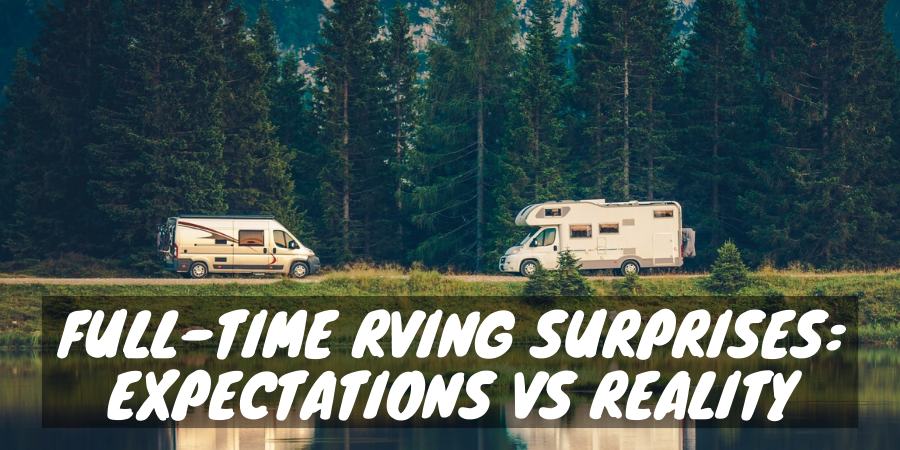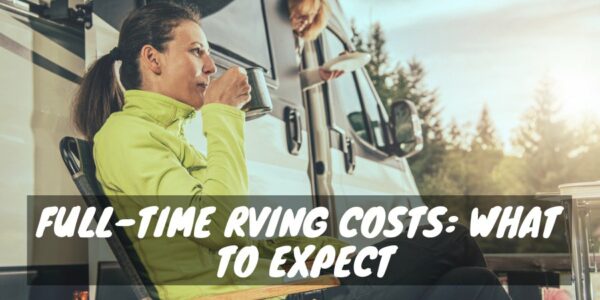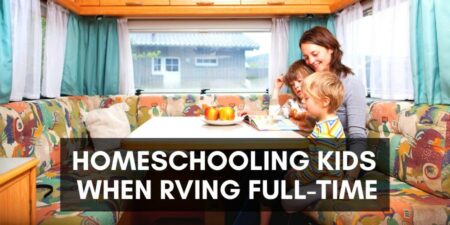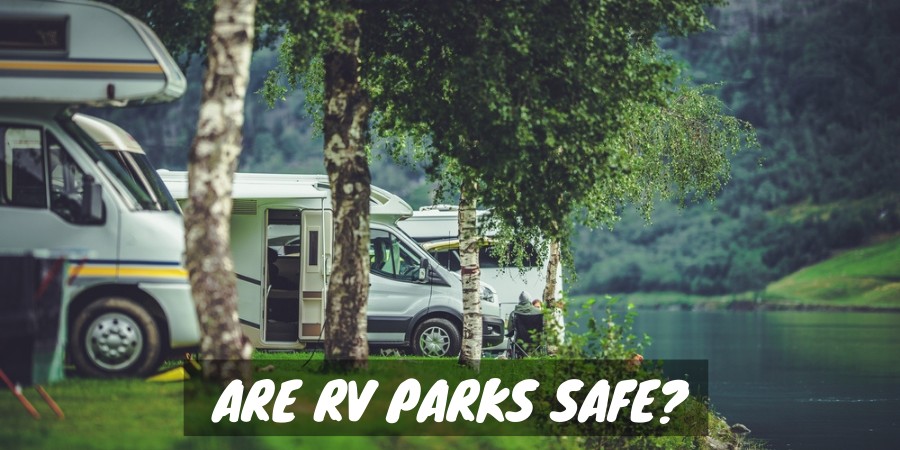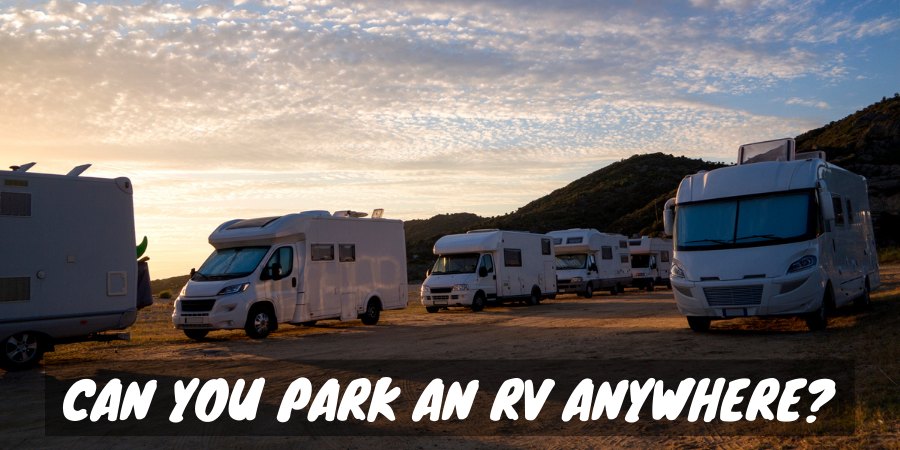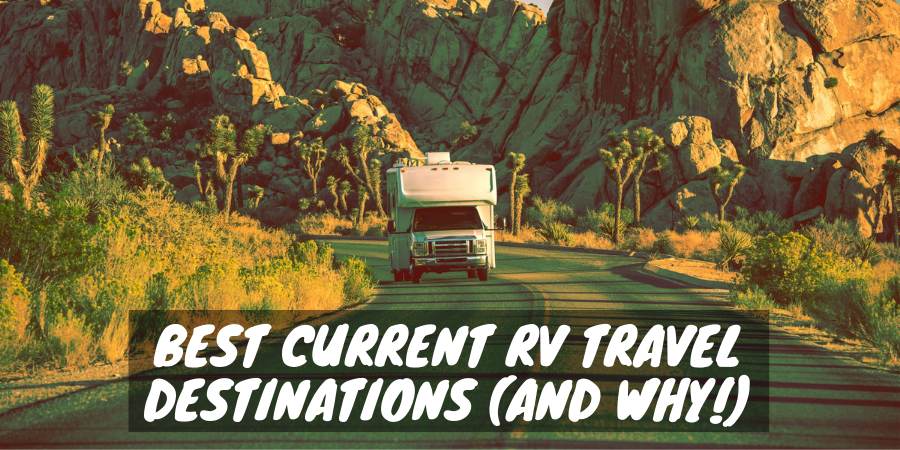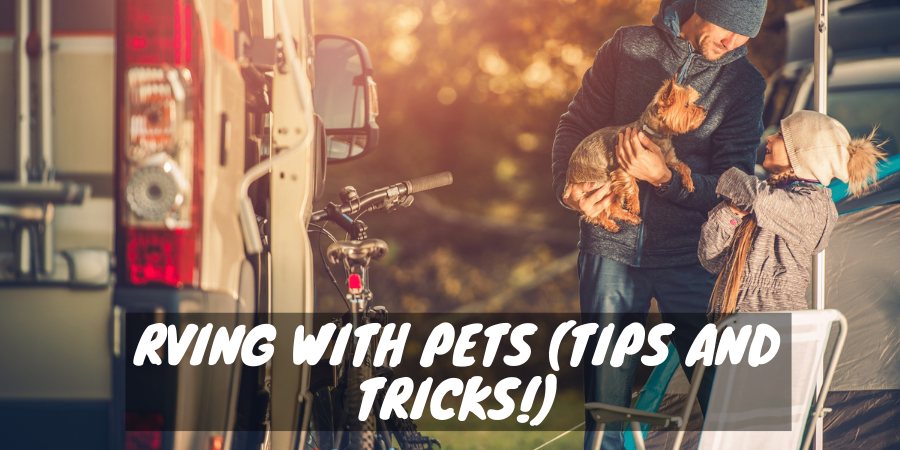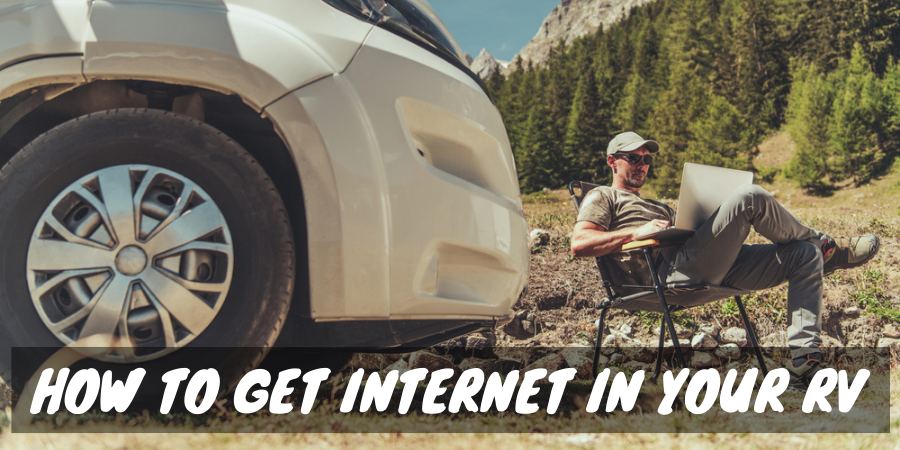Does full-time RVing sound intriguing, but you wonder if your expectations will live up to reality?
I can tell you right now that they won’t.
RVing 24/7 is not all adventure like those fun week-long camping trips, nor is it all work.
The key to a fulfilling RV lifestyle is knowing what to expect while on the road.
In this article, I’m going to detail six of the top full-time RVing expectations versus the reality of what life is like on the road so you can see if it’s right for you.
Expectation #1: Anyone Can Full-Time RV
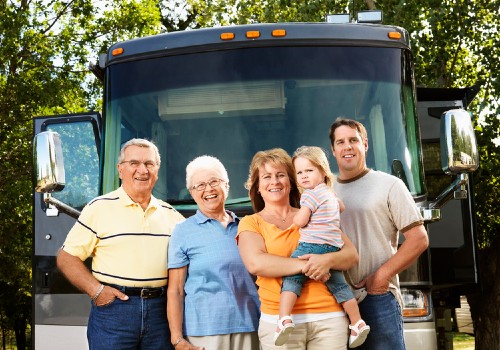
If you took a poll of RVers who are full-timing traveling longer than a year, you’ll most likely find they possess these certain personality traits:
- Adventurous
- Patient
- Self-reliant
- Open-minded
- Good-humored
- Tolerant
- Adaptable
- Minimalistic
- Optimistic
All of these traits make it much easier to find joy in the RV lifestyle and fewer problems finding so much fault you abandon your plans.
You don’t necessarily need to have all these traits to full-time RV, but they’re essential when things don’t go as you hope, which is pretty much all the time.
While I naturally have most of these traits, my expectations for living in an RV and traveling were nothing but fun, fun, fun!
New places, new people, new experiences! Just like camping, but longer!
The reality is that, yes, RVing is a ton of fun.
But, to get to the “fun,” there are endless miles on the highways, various campgrounds, dealing with breakdowns, medical and family issues, securing food and internet, staying on budget, and so many other factors I didn’t put a lot (or any) thought into beforehand.
If I were a timid, critical, judgemental, fussy, or impatient person, I probably would’ve been back to my old life in under a month, giving friends and family an earful about how awful RVing is.
The great news is that people who embrace this lifestyle and live it long enough tend to gain the personality traits above, even if they didn’t have them before.
My worry-wort partner is now very carefree, but it did take several years for the transition to happen!
I think, for this reason, I find that long-time RVers are the most laid-back, generous, and welcoming people I’ve ever met.
Expectation #2: Living in an RV Is Difficult
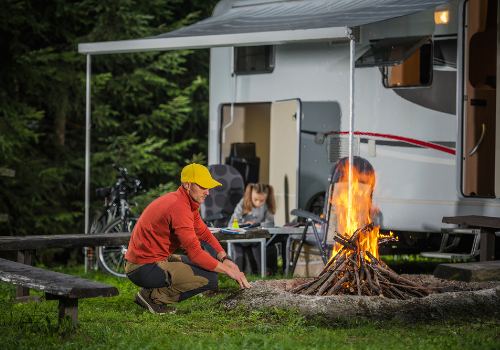
This topic is the first “make it or break it” aspect of a successful transition to life on the road.
Moving from a home or apartment into a recreational vehicle isn’t the easiest thing to do, mostly because you’ll need to dispose of most of your belongings.
So, in reality, how hard is it to live in an RV?
As a novice RVer, I expected that it’d be difficult to live in a small space for months on end, but having the great outdoors at my doorstep would alleviate any feelings of claustrophobia.
Like most of us, I had an abundance of clothes, furniture, decor, tools, and other items adults accumulated over the years that I had to get rid of as it all wouldn’t fit into even the largest of RVs.
Amazingly, I found becoming a minimalist, which is a requirement for this lifestyle, to be one of the most freeing and beneficial things I’ve ever done.
Newsflash! You can still appear neat and well-dressed with four pairs of pants instead of 20, you can survive perfectly fine with two forks and two plates, and you can get clean by taking a three-minute shower.
“Stuff” doesn’t define you, but experiences do.
So if you want to know, “Can you live in a small RV?” my answer is yes. I haven’t once felt the urge to upgrade to a larger camper, nor do I foresee doing so in the future.
In reality, if I do need to replace my RV, I’ll probably go even smaller than the 24 feet I have now. A smaller camper will make travel even more manageable and increase fuel economy, which means more dollars in my pocket to keep living the life.
Expectation #3: Full-Time RVing Will Save You Money
Prior to hitting the road, many people, myself included, thought being in an RV would be a cheap way to travel and live.
After doing some research and analyzing expenses, my monthly RV budget came out to around $2350. Wow, that was way more than I was expecting!
Is it cheaper to live in an RV than a home? According to statistics, the average monthly expense for a full-time RVing couple is $2275.
As you can see from my budget expectation, the choice of RV wasn’t going to save me much money over traditional home or apartment living, which is a vast misconception many people have about the lifestyle.
The reality is it’s common for people to think you do this because you’re poor or down on your luck.
RVing can often cost more than homeownership, especially for those who like to eat out or hit every museum. You also build up no equity for your future like you can with a house.
For budget clarification, I own a Class C motorhome and had plans to stay in four localized RV parks a month to explore a region fully before moving on to a new area. I also have a very low-cost phone plan and a hotspot for the internet that saves me around $120 a month.
I set my budget figures to include these monthly expenses:
| Fuel | $400 |
| Campgrounds | $1200 |
| Food | $200 |
| Phone and internet | $60 |
| Insurance – RV and health/life | $250 |
| Maintenance | $25 |
| Entertainment | $100 |
| RV memberships (Good Sam, AAA, etc.) | $20 |
| Miscellaneous (tolls, state and national park fees, etc.) | $75 |
So, how did my budget expectations meet with reality? For the first five months, it was fairly on target.
Now, my overall expenditures average around $1700 monthly.
I quickly learned that you could vastly reduce costs by taking advantage of monthly rates at RV campgrounds, enjoying stays at low-cost national and state parks, and doing some time off-grid.
You can stay at many lovely RV parks anywhere from $300-$700 a month.
Parking for weeks saves on gas, too, so if you pick places with convenient access to a grocery store and local attractions (we only use our bikes to get around after we park the RV), you can revamp your fuel budget needs.
Expectation #4: You Have to Maintain Residence in Your Home State
How can you legally live in an RV, travel, still get mail, and take care of regular appointments when you don’t have an official home?
This issue was a huge question for me and probably for you, too.
I expected that I would need to change my mailing address to one of my kids (which I did) and have them alert me to important correspondence. I also expected to return to my home state to renew my driver’s license or for doctor’s visits for insurance purposes.
But after several months in the camper, I found out about RV-specific mail services. These companies work like a post-office box, but they hold your mail until you’re ready for it.
The reality is that most full-time RVers depend on and use these mail services.
The service will forward mail to a post office in a town you’re going to visit or send it directly to a campground. For a fee, you can have the mail opened, scanned, and sent to your email.
Better yet, some RV services, like RVMail, provide a physical address in four different states you can use to establish residency and get a driver’s license.
Setting up a new residency can also help self-employed RVers who want to move to a state without a state income tax or one that offers lower health-care costs.
Expectation #5: An Average Day Will Be Full of Excitement
My daily life expectations in an RV included morning coffee while catching a sunrise, hiking trails in National parks, meeting folks from all around the world, and cooking dinner over the campfire.
The reality is that these things do happen, but it’s not every day, nor even every week.
There comes a time when your RVing pace just slows down in a good way.
Want to Connect With a Community of Over 1,078 RV Enthusiasts?
Exploring new regions and immersing yourself in the culture still happens, but there’s no intensity to “get it all done” because you quickly learn there’s no rush; you have all the time you want.
Love an area and want to see more? Just stick around another month. Not thrilled with where you are, you can move on.
In the US, we’re so programmed into our rushed one or two-week yearly vacations, watching the clock, and our go-go-go mentality that it’s hard to fathom your whole life is, in reality, now in vacation mode.
It’s a glorious moment when that reality finally sinks in, and one I will never forget.
Once you slow down and begin to live in the moment, you feel much less of an urge to rush out to hit tourist hot spots and deal with crowds. Instead, you wait for slow times to see sights that interest you so that you can enjoy them more fully, with much less stress.
A real part of your day will be taking care of necessary chores around the RV. Keeping up with laundry may mean an hour or so at the campground or local laundromat.
Maintenance like cleaning, caulking, or checking tire pressure still has to be done.
The bonus of simple RV living is that cleaning takes no time at all in comparison to a house. I can clean my entire camper, including making the bed and scrubbing the shower, in about 15 minutes.
RVers usually shop for groceries during travel between campgrounds, so they don’t have to move once they set up camp.
The emergence of online grocery delivery services has further simplified RV living, providing a convenient method for incorporating fresh fruits and vegetables into our meals when a farmer’s market isn’t accessible by bike.
The reality of daily full-time RV life is one of general relaxation and typical chores, with trips out for sightseeing or outdoor sports occurring maybe two or three times a week.
Travel days are exciting as you can’t wait to explore a new place. But, the reality is that road days are also stressful as you worry about your “home” becoming an RV accident statistic or incurring breakdowns or damage along your route.
Expectation #6: The Glow of the RV Life Will Diminish
Before I left for full-time RV life, I would hear a constant barrage of statements from family and friends that “you’ll be back within a year” or “there’s no way you’ll live in that tiny camper for long.”
My expectation was I wasn’t sure how I would like life on the road and didn’t want to feel pressure to stick with it if it wasn’t working out.
I had high expectations it would be a super cool adventure, but I also thought all that moving around may become tiresome or boring or that I would miss my family too much.
As you already know, I have been on the road for almost eight years, and my reality is I can’t imagine going back to living in a spacious home or leaving this life at all.
I am very content in my camper, and I find having few belongings to be very pleasant. After years of having closets full of clothes and 30 pairs of shoes, I now enjoy the simplicity of having what I need and not much more.
I get satisfaction from having a tight bond with my partner, from seeing the world with a new perspective, taking setbacks in stride, and learning new things that I didn’t have time for in my previous hectic life.
The glow of RV life hasn’t faded, but it certainly isn’t a bright beacon of “excitement.” It’s more of a gentle, consistent warmth that calls to me every time I fly home for a wedding or need to stay a few nights in a hotel.
Closing Thoughts
The problem many people have trying to RV full-time is that they let their expectations interfere with reality.
I’ve met countless travelers who are giving up the lifestyle because it wasn’t the fun and games or cost-saving adventure they thought it was going to be, and that’s okay.
Full-time RVing is not for everyone. Even if you love it, there’ll most likely come a time you’ll have to put it aside for a more traditional living arrangement.
But, for those who take the information above to heart and are ready to take the RVing plunge, don’t be afraid to give it a try. Doing so is a life-changing experience that builds memories and personal growth you can carry with you for the rest of your life!
Things to Know About Full Time RV Living
"Man cannot discover new oceans unless he has the courage to lose sight of the shore."
-- Andre Gide

